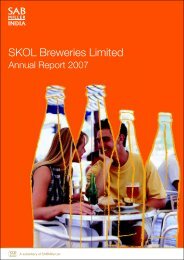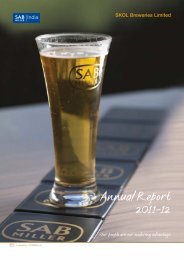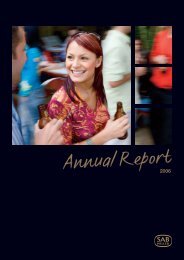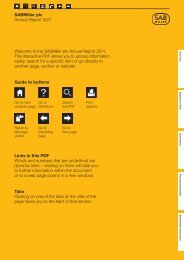Annual Report - SABMiller
Annual Report - SABMiller
Annual Report - SABMiller
- No tags were found...
Create successful ePaper yourself
Turn your PDF publications into a flip-book with our unique Google optimized e-Paper software.
<strong>SABMiller</strong> plc <strong>Annual</strong> <strong>Report</strong> 2010 Notes to the consolidated financial statements 75Notes to the consolidated financial statements1. Accounting policiesThe principal accounting policies adopted in the preparation of thegroup’s financial statements are set out below. These policies have beenconsistently applied to all the years presented, unless otherwise stated.a) Basis of preparationThe consolidated financial statements of <strong>SABMiller</strong> plc have beenprepared in accordance with International Financial <strong>Report</strong>ing Standardsas adopted by the European Union (IFRSs as adopted by the EU),IFRIC interpretations and the Companies Act 2006 applicable tocompanies reporting under IFRS.The financial statements are prepared under the historical cost convention,except for the revaluation to fair value of certain financial assets andliabilities, and post-retirement assets and liabilities as described in theaccounting policies below. The accounts have been prepared on agoing concern basis.The preparation of financial statements in conformity with IFRS requiresthe use of certain critical accounting estimates. It also requires managementto exercise its judgement in the process of applying the group’saccounting policies. Actual results could differ from those estimates.b) Recent accounting developments(i) Standards, amendments and interpretations of existingstandards adopted by the groupThe group has adopted the following as of 1 April 2009:■ IAS 1 (revised), ‘Presentation of financial statements’ requiresthe presentation of a statement of changes in equity as a primarystatement, includes non-mandatory changes to the titles of primarystatements and introduces a statement of comprehensive income,but allows the presentation of a two statement approach with aseparate income statement and statement of comprehensiveincome. The group has chosen to maintain existing primarystatement titles and to follow the two statement approach.■ Amendment to IFRS 7, ‘Financial Instruments: Disclosures’requires additional disclosures about fair value measurementand liquidity risk.■ IFRS 8, ‘Operating Segments’ requires separate reporting of segmentalinformation for operating segments. Operating segments reflect themanagement structure of the group and the way performance isevaluated and resources allocated based on group revenue andEBITA by the group’s chief operating decision maker, defined asthe executive directors. The group is focused geographically andas a result of the implementation of IFRS 8, Africa and Asia arenow presented as separate segments. Comparative informationhas been restated accordingly. While not meeting the definition ofreportable segments, the group reports separately as segmentsAsia, South Africa Hotels and Gaming and Corporate as thisprovides useful additional information.On 23 March 2010, the EU endorsed <strong>Annual</strong> Improvements toIFRSs (2009), which included an amendment to the disclosuresrequired by IFRS 8, ‘Operating Segments’. Although only mandatoryfor periods beginning on or after 1 January 2010, the group haschosen to adopt this amendment early. Following the implementationof IFRS 8 and the early adoption of the subsequent amendment,the group no longer discloses segment assets or liabilities, as theseare not reported to the group’s chief operating decision maker.The following standards, interpretations and amendments have beenadopted by the group since 1 April 2009 with no significant impacton its consolidated results or financial position:■ <strong>Annual</strong> improvements to IFRSs (2008).■ Amendment to IAS 23 (revised), ‘Borrowing Costs’.■ Amendment to IFRS 2, ‘Share-based Payments’ – VestingConditions and Cancellations.■ Amendment to IFRS 1, ‘First-time Adoption of IFRS’ and IAS 27,‘Consolidated and Separate Financial Statements’ on the ‘Cost ofan Investment in a Subsidiary, Jointly Controlled Entity or Associate’.■ Amendment to IAS 32, ‘Financial Instruments: Presentation’ andIAS 1, ‘Presentation of Financial Statements’ – ‘Puttable FinancialInstruments and Obligations Arising on Liquidation’.■ IFRIC 12, ‘Service Concession Arrangements’.■ IFRIC 13, ‘Customer Loyalty Programmes’.■ Amendment to IFRIC 9 and IAS 39, ‘Reassessment of EmbeddedDerivatives’.(ii) Standards, amendments and interpretations to existingstandards that are not yet effective and have not been earlyadopted by the group:The following standards, interpretations and amendments to existingstandards have been published and are mandatory for the group’saccounting periods beginning on or after 1 April 2010 or later periods,but which have not been early adopted by the group:■ IFRS 1 (revised), ‘First-time Adoption’, is effective from 1 July 2009.■ IFRS 3 (revised), ‘Business Combinations’, is effective from 1 July 2009.■ IAS 27 (revised), ‘Consolidated and Separate Financial Statements’,is effective from 1 July 2009.■ Amendment to IAS 39, ‘Financial Instruments: Recognition andMeasurement’ – Eligible Hedged Items, is effective from 1 July 2009.■ IFRIC 16, ‘Hedges of a Net Investment in a Foreign Operation’,is effective from 1 October 2008 1 .■ IFRIC 17, ‘Distribution of Non-cash Assets to Owners’, is effectivefrom 1 July 2009.■ IFRIC 18, ‘Transfers of Assets from Customers’, is effective from31 October 2009.■ Amendment to IFRS 2, ‘Group Cash-settled and Share-basedPayment Transactions’, effective from 1 January 2010 2 .■ Amendment to IAS 32, ‘Financial Instruments: Presentation’ –Classification of Rights Issues, is effective from 1 February 2010.■ <strong>Annual</strong> improvements to IFRSs (2009), is effective from 1 January 2010.■ Amendment to IFRS 1 for additional exemptions, is effective from1 January 2010 2 .■ IFRIC 19, ‘Extinguishing Financial Liabilities with Equity Instruments’,is effective from 1 July 2010 2 .■ <strong>Annual</strong> improvements to IFRSs (2010), is effective from 1 January 2011 2 .■ Amendment to IAS 24, ‘Related Party Disclosures’, is effective from1 January 2011 2 .■ Amendment to IFRIC 14, ‘Pre-payments of a Minimum FundingRequirement’, is effective January 2011 2 .■ IFRS 9, ‘Financial Instruments’, effective from 1 January 2013 2 .1 EU endorsed for 1 July 2009.2 Not yet endorsed by the EU.The adoption of these standards, interpretations and amendments isnot anticipated to have a material effect on the consolidated results ofoperations or financial position of the group.c) Significant judgements and estimatesIn determining and applying accounting policies, judgement is oftenrequired where the choice of specific policy, assumption or accountingestimate to be followed could materially affect the reported results ornet position of the group, should it later be determined that a differentchoice be more appropriate.Overview Business review Governance Financial statements Shareholder information













